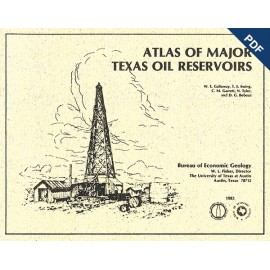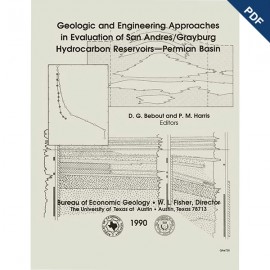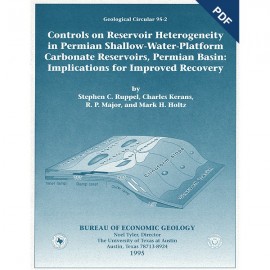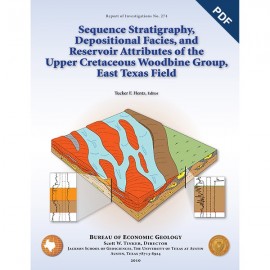Geological Circulars
-
Books & Reports
- Reports of Investigations
- Guidebooks
- Udden Series
- Geological Circulars
- Down To Earth
- Atlases of Major Oil and Gas Reservoirs
- Texas Memorial Museum Publications
- Environmental Geologic Atlas of the Texas Coastal Zone
- Mineral Resource Circulars
- Other Reports
- Seminars and Workshops
- Handbooks
- Submerged Lands of Texas
- Symposia
- Annual Reports
- Open File Reports
-
Maps & Cross Sections
- Thematic Maps
- Miscellaneous Maps, Charts & Sections
- Geologic Atlas of Texas
- STATEMAP Project Maps
- Geologic Quadrangle Maps
- Cross Sections
- Highway Geology Map
- Energy and Mineral Resource Maps
- Shoreline Change and Other Posters
- Wilcox Group, East Texas, Geological / Hydrological Folios
- Bouguer Gravity Atlas of Texas
- River Basin Regional Studies
- Featured Maps
- Posters
- Teachers & the Public
-
Geological Society Publications
- Gulf Coast Association of Geological Societies
- Alabama Geological Society
- Austin Geological Society
- Corpus Christi Geological Society
- Houston Geological Society
- Lafayette Geological Society
- Mississippi Geological Society
- New Orleans Geological Society
- South Texas Geological Society
- GCS SEPM Publications
- Historic BEG & UT Series
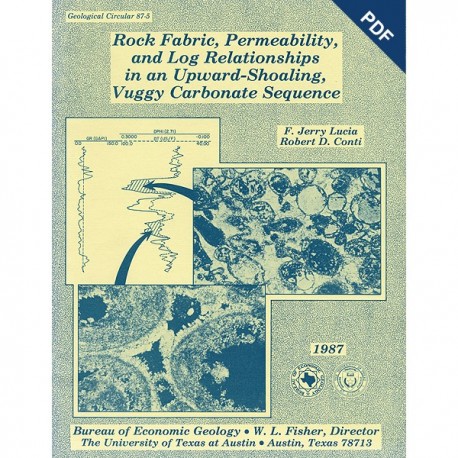
Rock Fabric, Permeability, and Log Relationships in..., Vuggy Carbonate Sequence. Digital Download
GC8705D
For a print version: GC8705.
GC8705D. Rock Fabric, Permeability, and Log Relationships in an Upward-Shoaling, Vuggy Carbonate Sequence, by F. J. Lucia and R. D. Conti. 22 p., 26 figs., 4 tables, 4 appendices, 1987. doi.org/10.23867/gc8705D. Downloadable PDF.
To purchase this publication in book format, please order GC8705.
ABSTRACT
Permeability in a vuggy carbonate sequence can be related to particle size, separate-vug porosity, and interparticle porosity. Total porosity can be determined from neutron, acoustic, and density logs, but the distinction made between interparticle and separate-vug porosity using log responses has never been quantifiable. As a result, such distinction has never been integrated into permeability estimates drawn from log analysis. Two wireline methods, one involving acoustic logs and one involving resistivity logs, are investigated in this report, and both are found to determine separate-vug porosity. Acoustic-neutron cross plots are used to determine separate-vug porosity by calculating the deviation of the acoustic response from the normal response for a given lithology. The resistivity-porosity relationship described by the Archie equation is used to calculate separate-vug porosity by relating the m factor in the Archie equation to the ratio of separate vug-porosity to total porosity. In 100-percent-water-bearing intervals of known water resistivity, resistivity and porosity values from wireline logs can be substituted into the Archie equation, and them factor can be calculated. Interparticle porosity is calculated by subtracting the log-derived separate-vug porosity from the log-derived total porosity. Permeability is determined through a series of equations that relate interparticle porosity, particle size, and permeability. Resulting permeability values reproduce the depth profile of core analysis permeabilities. Statistical analysis comparing calculated permeabilities with corresponding core permeabilities shows that the resistivity method has a correlation coefficient of 0.83 and the acoustic method a correlation coefficient of 0.69.
Keywords: acoustic logs, carbonate, permeability, petrophysics, porosity, resistivity logs, rock fabric, upward-shoaling sequence, vugs
Citation
Lucia, F. J., and Conti, R. D., 1987, Rock Fabric, Permeability, and Log Relationships in an Upward-Shoaling, Vuggy Carbonate Sequence: The University of Texas at Austin, Bureau of Economic Geology, Geological Circular 87-5, 22 p. doi.org/10.23867/gc8705D.

